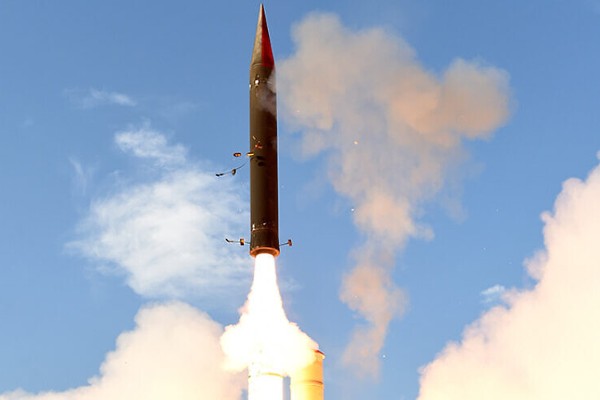Europe as a region is already the leading importer of Israeli defense technology.
By Yaakov Lappin, JNS
Already in early April, reports began surfacing that Berlin is interested in purchasing Israeli-made air- and missile-defense systems, in addition to unmanned aerial vehicles.
Russia’s invasion of Ukraine was a little over a month old, and a Bundestag Defense Committee delegation visited the Israel Defense Forces.
The lawmakers expressed particular interest in the Arrow-3 defense system, which is made by Israel Aerospace Industries (IAI) and provides exo-atmospheric interception of ballistic missiles.
Now, with reports surfacing that Berlin has made a preliminary decision to buy the Arrow-3, rather than the competing THAAD (Terminal High Altitude Area Defense) system made by Lockheed Martin, Israel appears to be a step closer to playing a significant role in Germany’s ability to defend itself against future Russian missile threats.
The Arrow-3 is operational in Israel, part of the country’s multi-tier air-defense program. It intercepts and destroys ballistic threats in space using the most advanced technology, and can adeptly navigate outside the Earth’s atmosphere. IAI is now developing the Arrow-4, which will operate within and outside the atmosphere.
“The innovative Arrow-3 interceptor is designed to intercept and destroy the newest, longer-range threats, especially those carrying weapons of mass destruction,” IAI says on its website.
Monday’s meeting between Israeli Prime Minister Yair Lapid and German Chancellor Olaf Scholz in Berlin yielded significant clues that a major defense deal is in the works (according to Bloomberg, the cost could be around $2 billion).
Lapid told reporters that Israel “will play a role in developing Germany’s new defense force, namely in the sphere of air defense,” while Scholz said his country is “eager to collaborate with Israel” on defense, “particularly in the field of air defense, where Israel has a very effective product with the Arrow-3 system.”
After Russia invaded Ukraine on February 24, shaking Europe to its core and doing away with the idea of secure territorial sovereignty and air space, Germany established a €100 billion ($100 billion) defense fund designed to speed up its force build-up after many years of neglect. The fund is in addition to the country’s annual defense budget of around €50 billion.
Germany seems keen to prioritize air defense against Russian missile threats after the latter fired thousands of cruise missiles and an unknown but likely smaller number of ballistic missiles at Ukraine.
Now, Israel is set to play a key role in Germany’s ability to defend itself against Russian missiles.
Even before the invasion of Ukraine, Berlin was interested in boosting its air defenses against long-range threats, but the ongoing war has caused this desire for new and better systems to greatly expand.
The Arrow-3 system features advanced radar that constantly scans for threats, and when it detects them, it tracks and dispatches interceptors into the air over a very large area.
Mutually Beneficial Defense Deals
The likely German purchase fits into a larger pattern of growing European defense acquisitions from Israel.
According to Israeli Defense Ministry figures, Europe as a region is already the leading importer of Israeli defense technology, accounting for 41% of sales in 2021 out of a total of $11.3 billion.
The Haifa-based Rafael Advanced Defense Systems, for example, has mass-produced Spike fire-and-forget anti-tank guided missiles for European clients, while last year, Elbit Systems, also headquartered in the northern city, concluded a major deal with Britain’s Royal Navy to supply electronic warfare capabilities.
The trade will be two-way; Germany is supplying Israel’s most expensive and strategically important platform, the existing Dolphin and future Dakar submarines.
ThyssenKrupp will deliver three Dakar submarines to the Israel Navy, and the German shipbuilder has already handed over two new-generation Dolphin-2 submarines (with a third due next year), for a total fleet of six. The German firm also produced four Sa’ar 6-class corvettes for Israel, which are designed to protect the Jewish state’s natural gas platforms in the Mediterranean Sea.
These sales reflect extensive, mutual and strategic cooperation on defense, with the Arrow-3 representing a dramatic Israeli export to a Europe that has been permanently changed by Russia’s war against Ukraine.
